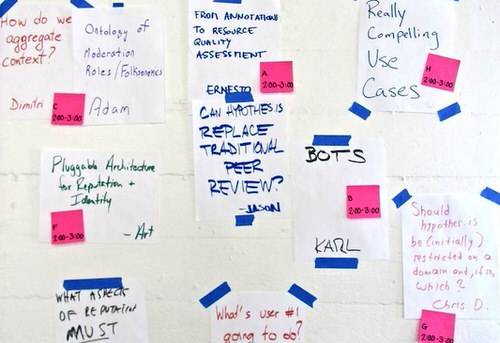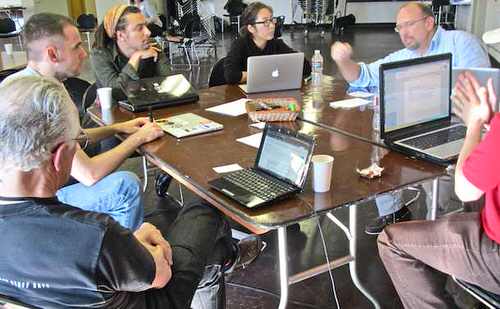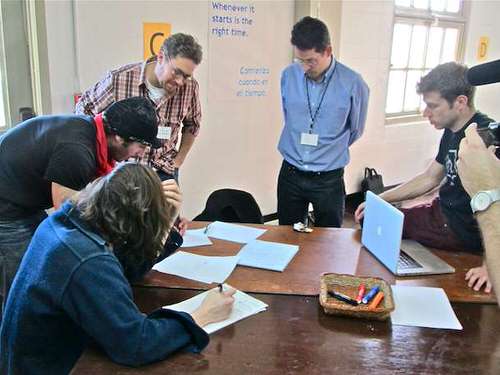
Last week, I had the great fortune of attending the Hypothes.is Reputation Workshop. Hypothes.is aims to build nothing less than a peer review layer for the whole Internet. It’s a mind-boggling idea when you let it sink in. The technical challenges are formidable, and the cultural ones are even bigger. Nevertheless, the excitement around the project is intense and contagious.

It’s a project that has drawn in the likes of Wikimedia, the Internet Archive and the Electronic Frontier Foundation. The stewards of the free Web want this problem solved. To get the ball rolling on figuring this out, Hypothes.is invited a colorful panel of experts – and… me. – to a three-day think tank on San Francisco Bay to identify the challenges, parse them out, and prototype solutions. And guess what? We pulled it off.

Why We Need Hypothes.is
There are two fundamental, related cultural problems with the Web that Hypothes.is wants to address: identity and reputation. Reputation is the main problem, but you can’t approach it without fixing identity. A reputation doesn’t refer to anything without a consistent identity behind it.
The goal is to build a system of reputation for, ideally, all the content on the Web. No filter exists today for us to assess what information is good and what information is bad.
Right now, the Web is vulnerable to gaming. Google’s search ranking algorithm is a fine piece of early reputation technology, and it’s constantly improving, but it’s exploitable by playing with back-links and keywords.
And now that the social filters of Facebook, Twitter and Google+ have begun to dominate the time of Web users, the Web runs the risk of becoming an out-and-out popularity contest. If we could filter the Web by reputation, we could turn it into a meritocracy.

Identity & Reputation
Today, identity and reputation are fragmented by different, often competing online services. We have Facebook identities, Google identities and email identities. We have OpenIDs, but we might have a bunch of those. Some of these identities may be linked, but the links are weak.
In each of these networks, we also have reputations, however basic they may be. Our contributions are liked and +1d by friends and ranked by an algorithm. These services might provide APIs to be interoperable with other sites and applications, but that just extends the domain of the dominant platform, Facebook or Google. It’s not a multi-faceted identity. It’s the same monolithic identity extended everywhere.
Plus, identity providers like Facebook and Google have interests that run counter to ours. Real people are multi-faceted. We want to be able to express different aspects of ourselves in different contexts. But Facebook, Google et al have built businesses upon consistent, unchanging, public identities for all of us, despite nasty, sometimes dangerous consequences.
People with enough privileges don’t have to worry about their public identities and reputations, but marginalized or vulnerable people around the world face real danger for speaking out online. They still need the ability to participate fully. That’s why a truly Web-wide reputation system cannot be subject to any company’s “real names policy.”
We learned in the workshop that the best kind of online identity is one that is pseudonymous but expensive. It’s easy to get one pseudonym, but it’s very difficult to change or create new ones. A pseudonym could also be privately verified with a government-issued ID or some other standard, so the user remains pseudonymous to the world, but the reputation system knows who it is.
It could also plug into existing identity services. There’s no reason this identity couldn’t be connected with Google or Facebook if the user so desired. Those are existing, thriving communities, and they’ll need annotation, too. They just can’t be the sole provider of identity.
Hypothes.is needs relatable identities to build a reputation system. It will have its own reputation algorithms, mechanisms and moderation strategies. It will implement its trusted users’ contributions as a layer of reputation that can apply to all the content on the Web. Hypothes.is users will be like Wikipedia editors, but for everything.

What Might Hypothes.is Look Like?
Hypothes.is wants to build a layer of annotations attached to a system of reputation. In order to do that, it also needs to create a community around the right set of tools.
In the workshop, we imagined a few different interfaces. One crucial interface decision will be the way annotations are displayed on top of the content as a user browses the Web. It could be “heat maps,” where areas of the document with lots of annotation are color-coded to indicate activity, quality or both. It could be a sidebar full of various annotations, even multimedia ones.
Once it’s in place, a user signed in to Hypothes.is will be able to judge a document’s reputation on sight or even filter a long list of documents. Participating sites will be able to stand behind their visible reputations. The Web will be less sketchy and seedy in places where clarity and transparency are needed.
And it won’t be imposed by some central authority, but rather by the work of dedicated annotators from all around the Web. Call them journalists, call them editors, call them curators, call them whatever you want. The advantages of this system over one based on blogging, hype and personality should be obvious. We could have a standard for assessing the quality of Web content, and that will help us assign real value to it.
If you’re curious about the particular, potential designs we discussed, you should visit Dario Taraborelli’s amazing notes on Wikipedia. He goes into depth about the possible solutions we considered. There’s no product news to report yet. I’m just here to update you on the state of the conversation. It’s thriving, it’s exciting, and it’s necessary.
If you want to follow along, visit Hypothes.is and follow @hypothes_is on Twitter. As Hypothes.is makes news, we’ll keep bringing it to you here on ReadWriteWeb.
And if you have ideas you want to contribute to this project, the Hypothes.is team has set up an email address for you to submit them: ideas {at} hypothes.is
Photos by Lisa Heft courtesy of Hypothes.is
Disclosure: My really good friend Randall Leeds is building Hypothes.is as the technical co-founder. This happened after RWW started covering founder Dan Whaley’s efforts to create an annotation system for the whole Web. It’s a complete coincidence. Still, I admit that this may have an impact on my reporting. But hey, at least my fund isn’t investing in it.










